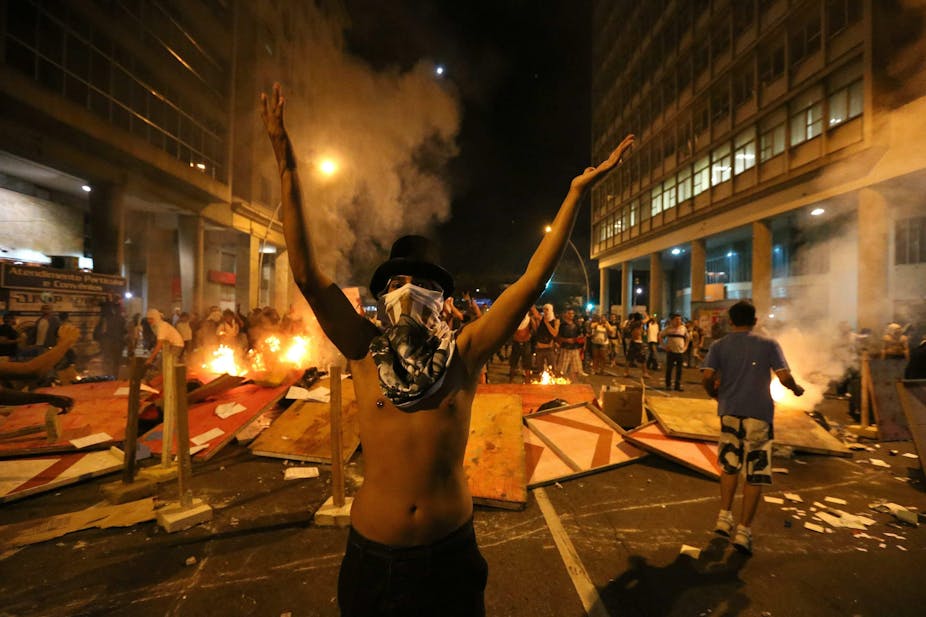During last year’s Confederations Cup football tournament in Brazil, hundreds of thousands of demonstrators took to the country’s streets to demand change. Protests that started with a clear opposition to rising public transport fees quickly shifted focus to the enormous amount of government money being spent to host the 2014 World Cup:
We don’t need the World Cup, we need health and education.
Police used extremely violent measures to stop the protesters, which inflamed the already heated situation.
Similar protests will no doubt re-appear during the World Cup, when the world’s best football players display their talents in brand-new stadiums across Brazil. Millions of tourists are expected to travel to Brazil, but these visitors will also witness political protests and occasionally mix with demonstrators.
Sporting mega-events like the World Cup are accompanied by lofty promises on their lasting legacy for the host country. In Brazil and elsewhere, such legacy planning helps justify the billions spent on organising and hosting the event. So what kind of legacy will the World Cup leave in Brazil?
Economic versus cultural and political legacy
The legacy of sporting mega-events is often perceived in economic terms, with a focus on benefits to employment, tourism, infrastructure and urban renewal. During the World Cup, numbers are clearly an important part of legacy analysis, but they are far from being the only contributing factor to the overall legacy. It is at the sociocultural and political levels that the legacy of the World Cup may be felt the most.
Sporting mega-events do not happen in a social vacuum. They have to account for the past, the present and even the future of the communities involved. The World Cup is hosted by countries with remarkable histories where social changes are constantly occurring, sometimes at a rapid pace.
2014 is an important year for Brazil. It has been 60 years since Getulio Vargas – one of the most remarkable elected presidents in Brazilian history – committed suicide. This year also marks the 50th anniversary of the coup d’état that installed the 25-year military dictatorship: another historic “milestone” that continues to bring bad memories for Brazilians.
In 2014, Brazilians also celebrate the 30th birthday of the Diretas Já! (Direct Elections Now) movement, which mobilised millions of protesters to take to the streets for the first time since the 1964 military coup. Despite its ultimate goal of direct elections being initially defeated by the Brazilian parliament, this movement opened the door for the re-democratisation of Brazil after 25 years of dictatorial rule.
Finally, a few months after the World Cup, Brazilian citizens will elect their federal government in what will be the seventh straight democratic presidential election – a record in the country’s history.
Infrastructure changes
The legacy of any World Cup is highly contentious. The event temporarily increases the number of tourists and jobs. In Brazil, it will also bring quality football stadiums to a country where these have long been in a very bad state.
Upgrades to airports and public transport have taken place. However, this has been a slow process. Some upgrades will not be complete in time for the tournament. The promised urban mobility legacy might only come to fruition after the tournament has ended.
At the same time, the World Cup has put the alleged corruption surrounding stadium construction under global scrutiny. In a clear waste of public money, some of the new facilities will become white elephants after the World Cup as there will be no spectators to fill them.
Forced relocations in the past few years have already profoundly affected several disadvantaged communities in the past few years.

An unanticipated legacy
One of the most notable legacies of the World Cup may yet be its unanticipated political legacy. Even before it starts, the event has magnified and given a global platform to the social movements that had been on Brazilian society’s margins in the last decade; it has accelerated the democratic battle that is underway in Brazil.
On one side, progressive movements push for an expansion of the social agenda; on the other, conservative powers seek to erase the recent social improvements through the use of both their mass media power and state repression.
In addition, Brazilians now want to know the truth about their recent history. The government and civil society have at last started to open the secret files that show the army’s involvement in systematic torture and killing of the opposition during the military government.
Anti-democratic forces that supported the dictatorship are still present within the army and the police. They continue to use torture, illegal detention and physical elimination to silence their opponents, and they infiltrate social movements in order to create chaos in any peaceful civil demonstration.
During the next few weeks, the world will witness a first-class sporting event. Brazilians will be cheering on the Brazilian team, but will also be fighting a political battle on the streets. Most want to increase their social and political rights; others want to block civic progress.
As painful as this process will be, the maturing of Brazil’s democracy is an unplanned legacy of the World Cup whose impact is not to be underestimated.
Editor’s note: Jorge and Ramon will be on hand for an Author Q&A session from noon to 1:30pm AEST tomorrow (June 6). Post any questions about the legacy the World Cup may leave in Brazil below.

